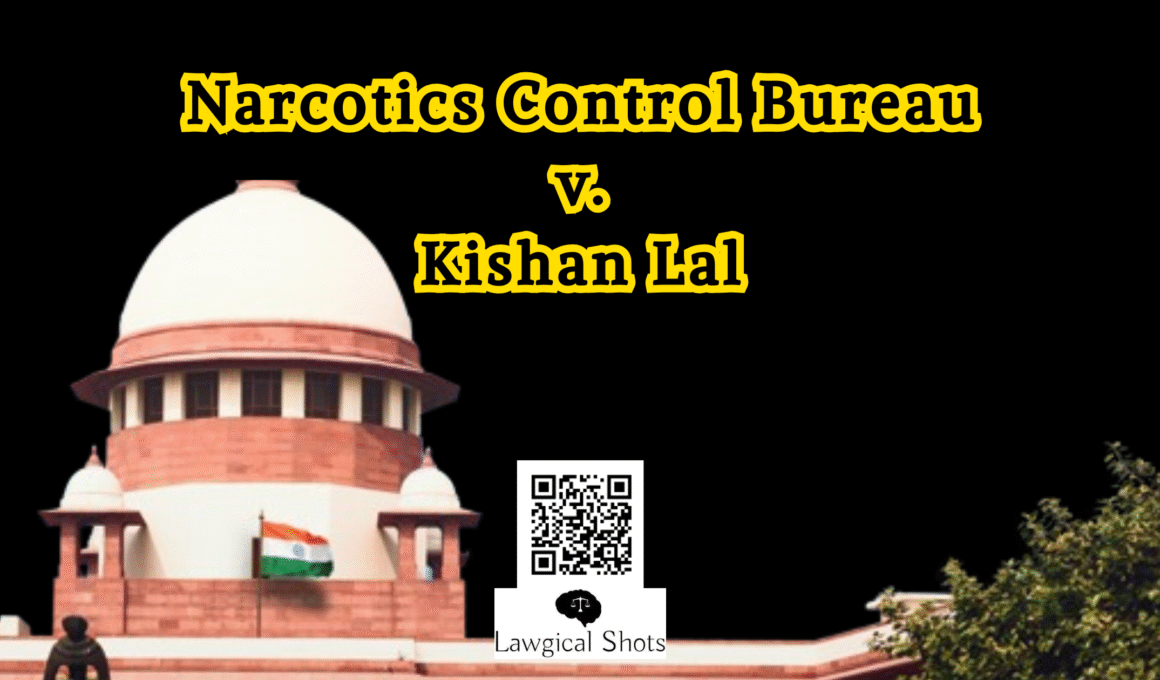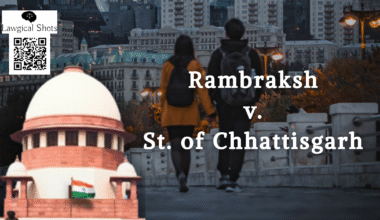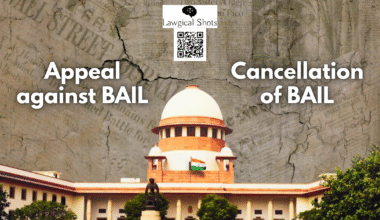This case provides insight into the Narcotic Drugs and Psychotropic Substances (NDPS) Act 1985, related to grant of bail under Section 37, fettering the High Court’s power to grant bail under Section 439 of the Criminal Procedure Code. The Supreme Court in this case limited the scope of the High Court related to the grant of bail under Section 439, with the stringent provision under the NDPS Act. Let’s find out what was held in NCB versus Kishan Lal.
Factual Background in NCB vs Kishan Lal
- The Respondent in this appeal was arrested for the offences under various sections of the NDPS Act, 1985, and was refused bail. He was remanded to judicial custody by the trial court.
- Subsequently, the respondent filed a writ petition and a criminal miscellaneous petition before the High Court seeking bail under Section 167(2), Criminal Procedure Code, on the following grounds:
– Belated filing of the charge sheet;
– Accused’s illness.
- The matter was referred to the Division Bench of the High Court, which granted bail to the Respondent by subsequently ruling out the restriction put by Section 37 of the NDPS Act over the power of the High Court in granting bail under Section 439 of the Criminal Procedure Code.
- Aggrieved by this, the Narcotic Control Bureau appealed to the Supreme Court and contended that the High Court had no unrestrained right/powers in the matter of granting bail, as the provision of Section 37 of the NDPS Act overrides Section 439 of the Criminal Procedure Code.
NCB arguments against Bail to NDPS Accused
- The learned counsel from the appellant side contended that the High Court had misconstrued the provisions of Sections 36A and 37 of the NDPS Act, stating the reason that under the NDPS Act non-obstante clause overrides the provision of Section 439 regarding general bail power under CrPC.
- Contended that no bail under Section 37 NDPS can be unless:
(i) The Public Prosecutor has been allowed to oppose the application for such release, and
(ii) Where the Public Prosecutor has opposed the bail application, the court is satisfied that there are reasonable grounds for believing that he is not guilty of such offence and that he is not likely to commit any offence while on bail.
- Arguing that bypassing Section 37 of the NDPS Act by the High Court under the provision of Section 439 CrPC related to grant bail, would defeat the purpose of the formation of the special legislation to encompass the power related to this matter while maintaining the objective of the NDPS Act to provide for stringent provisions regarding control and regulations of the operations relating to narcotic drugs and psychotropic substances.
Supreme Court on High Court’s power to grant bail in NDPS case
The Court hinted that the preamble to the NDPS Act shows that the object of the Act is to consolidate and amend the law related to narcotic drugs and to make stringent provisions for the control and regulation of operations relating to narcotic drugs and psychotropic substances.
Section 37, as amended, starts with a non-obstante clause stating that, notwithstanding anything contained in the Code of Criminal Procedure·, 1973, no person accused of an offence prescribed therein shall be released on bail unless the conditions contained therein are satisfied.
The Supreme Court, while delivering its judgment, referred to the case Usmanbhai Dawoodbhai Menon v. the State of Gujarat. The Supreme Court upheld the Gujarat High Court’s decision for not granting bail under Section 439 of Cr.P.C., citing that the Court lacks jurisdiction when it comes to ruling over the decision of a designated court to grant bail under Terriorist and Disruptive Activities (Prevention Act) TADA for the offence under Sections 3 and 4. The Court stated that the TADA Act, being a special statute, supersedes the general provision of Section 439 Cr.P.C. The designated Court under the TADA has the power to grant anticipatory bail depending on the merit of the case.
While referring to the present case, the High Court’s power under Section 439 of Cr.P.C shall not conflict with the special statute like the NDPS Act and be subject to Section 37 NDPS Act. Where there is a provision of a non-obstante clause which unambiguously shows the overriding power over the High Court’s power to grant bail under Section 439 of the Cr.P.C. Section 36 A sub-section 3 does not intact the power of the High Court regarding granting bail under Section 439; rather, those powers must be exercised within the framework of Section 37 of the NDPS Act.
While in this case, the Supreme Court allowed the accused to remain on bail, since they had been on bail for a long time, and the Narcotic Bureau did not press for the cancellation of the bail.
Significance of NCB vs Kishan Lal Judgment
It is a significant judgment, emphasising the importance of the statutory provision of the Act over the general provision, even limiting the power of the High Court to adhere to the provision cited under Section 37 of the NDPS Act while granting bail, intaking the intent of the legislative statue to provide for the stringent provision related to offences related to the Narcotics drugs and psychotropic substances.
The Supreme Court judgment on NCB vs Kishan Lal has been analysed by our intern, Ms Neha Patidar. She has been assisting the team in bringing informational legal blogs.








